Thailand’s archipelagos are lush, tropical paradises offering unique experiences far removed from the bustling tourist centers. This guide ventures beyond the well-known to spotlight the country’s lesser-known islands, where the sands are unspoiled, the ecosystems are fragile, and the sense of adventure is palpable. From the tranquil shores of Koh Yao Noi to the untouched beauty of Koh Phayam, these hidden gems provide a serene escape into Thailand’s natural wonders, offering both adventure and relaxation in equal measure.
1. Koh Yao Noi
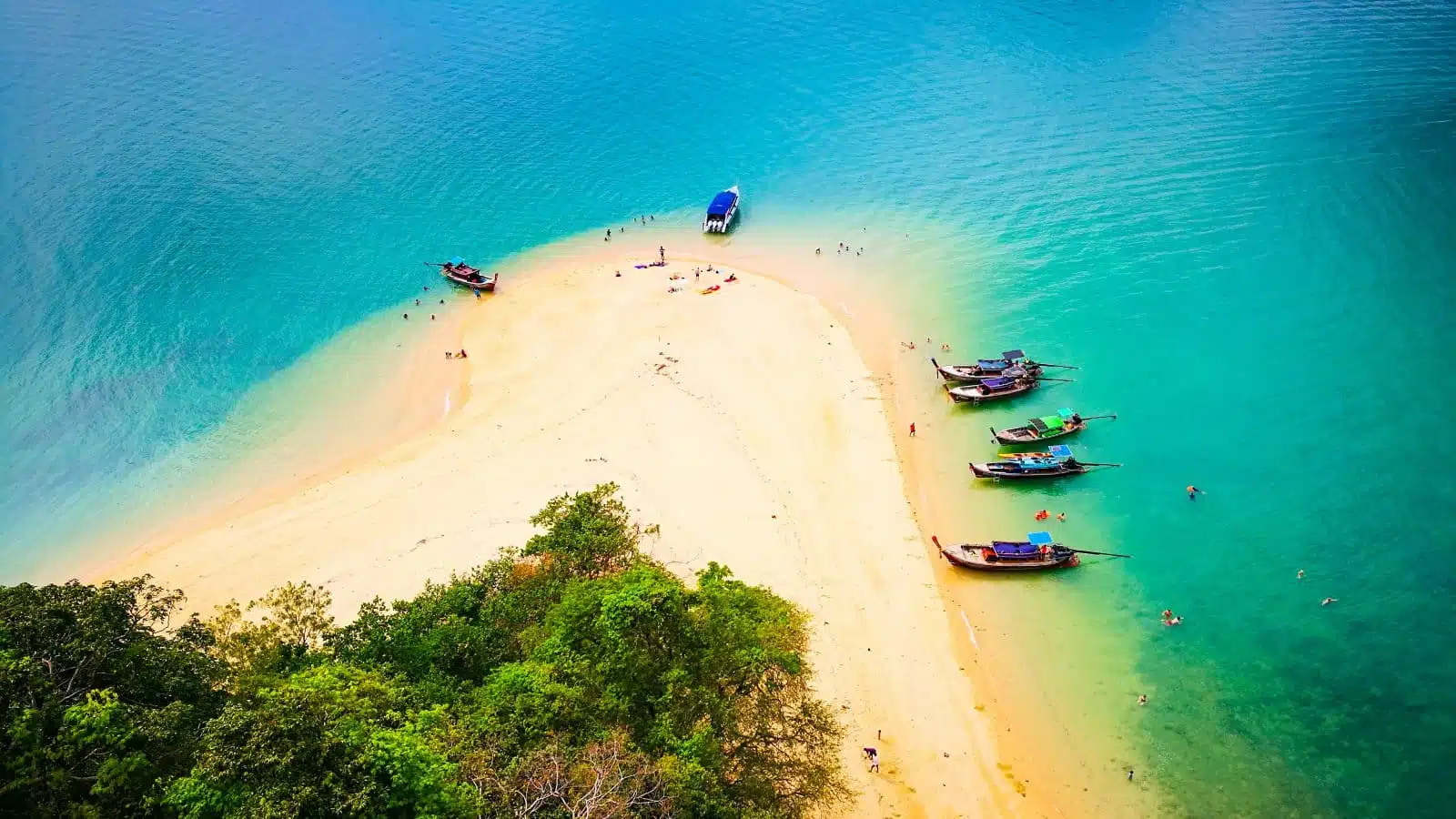
Image Credit: Shutterstock / KOHYAO
Koh Yao Noi, a jewel in the emerald waters of Phang Nga Bay, remains one of Thailand’s most serene escapes, offering a rare glimpse into the traditional way of life untouched by mass tourism. The island’s landscape, a picturesque blend of rubber plantations, rice paddies, and mangrove forests, is framed by the stunning backdrop of limestone karsts rising from the sea. For the adventurous, kayaking through the hidden lagoons and secret caves presents an unparalleled opportunity to connect with nature’s majesty. Meanwhile, cycling along the island’s rural roads reveals small villages and local markets, where the pace of life moves to the gentle rhythm of the tides. The island’s commitment to eco-friendly practices is evident in its boutique resorts and homestays, which offer a sustainable way to experience its natural beauty.
Insider’s Tip
Rent a bike or a scooter to explore the island’s interior, where traditional wooden houses on stilts and small, family-run rubber farms paint a picture of rural Thai life.
When to Travel
The best time to visit Koh Yao Noi is during the dry season, from November to April, when the weather is sunny and the seas are calm, making it ideal for outdoor activities and exploration.
How to Get There
Koh Yao Noi is accessible by boat from Phuket or Krabi, with regular services running to the island’s main pier.
2. Koh Phayam
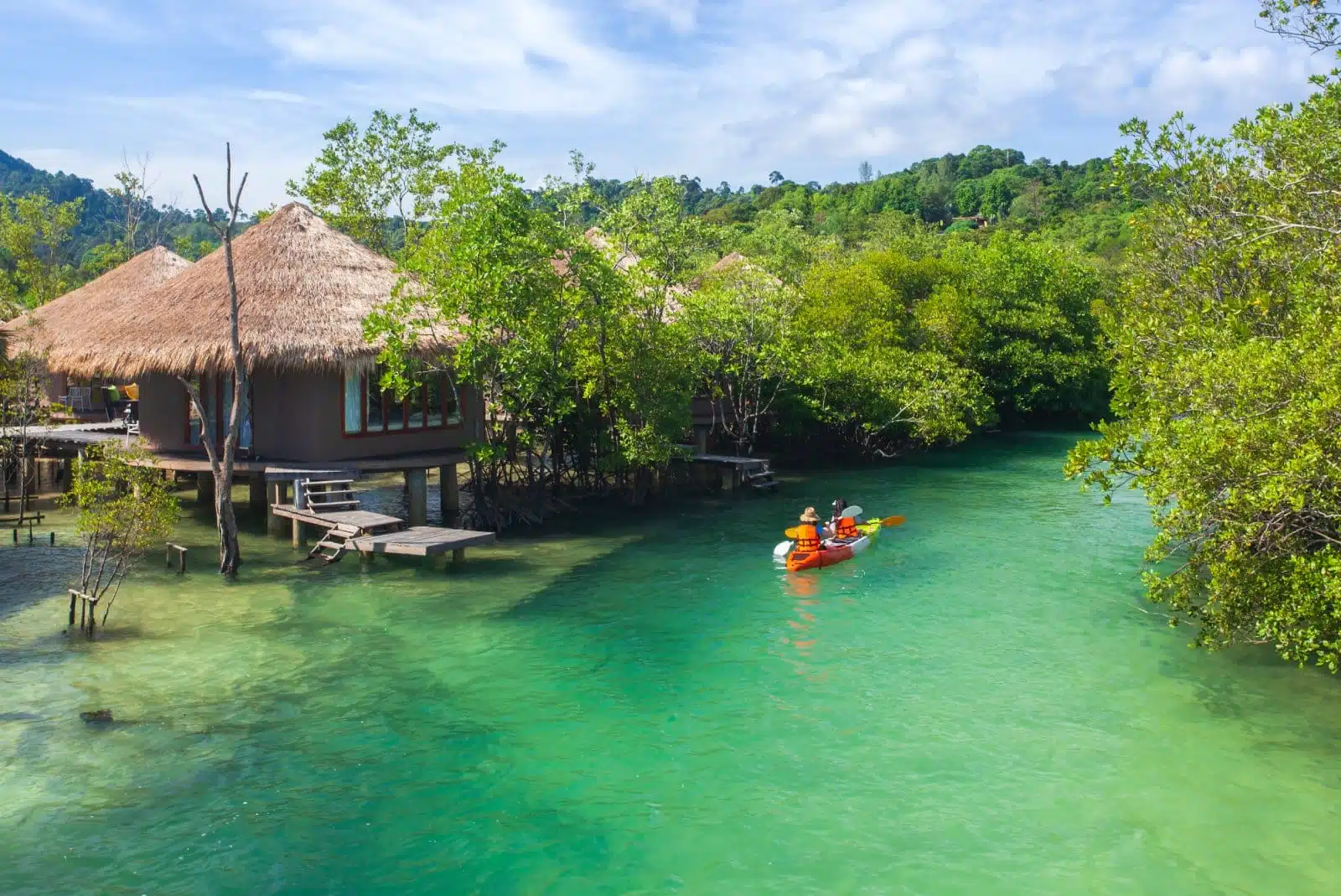
Image Credit: Shutterstock / Dragonite_East
Koh Phayam, with its laid-back atmosphere and pristine natural beauty, stands as a bastion of tranquility in the Andaman Sea. The island’s beaches, notably Ao Yai and Ao Khao Kwai, boast some of Thailand’s best surfing waves, attracting surfers from around the globe. Beyond the surf, the island’s interior is a lush haven for wildlife, offering peaceful walks under the canopy of tropical forests. The absence of cars enhances the sense of serenity that envelops the island, allowing the sounds of nature to take center stage. Small, eco-conscious businesses dot the landscape, from rustic bungalows to beachfront cafes, each contributing to the island’s charm without overshadowing its natural beauty. Koh Phayam is a reminder of Thailand’s ability to preserve pockets of paradise amid the rush of modern life.
Insider’s Tip
Visit during the late monsoon season (September to November) for the best surfing conditions and to experience the island’s natural beauty without the crowds.
When to Travel
Late monsoon season, from September to November, offers the best surfing conditions. However, for calmer seas and leisurely beach activities, the dry season from December to March is preferable.
How to Get There
Koh Phayam is reachable by speedboat or ferry from Ranong, with the journey offering spectacular views of the Andaman Sea’s islands.
3. Koh Libong

Image Credit: Shutterstock / Petr Malyshev
Koh Libong, Thailand’s hidden gem in the Trang Archipelago, offers an authentic escape into nature. The island’s extensive mangrove forests and seagrass beds are vital ecosystems, providing sanctuary for many bird species and the elusive dugong. The tranquility of Koh Libong is palpable, with long stretches of deserted beaches offering peaceful solitude and spectacular sunsets. The local communities, predominantly Muslim fishermen, add rich culture to the island’s natural allure. Their traditional way of life, closely tied to the rhythms of the sea, offers a fascinating insight into sustainable living. Koh Libong’s commitment to conservation and community-based tourism makes it an exemplary destination for those seeking to responsibly explore Thailand’s natural and cultural heritage.
Insider’s Tip
Take a guided boat tour to spot dugongs in their natural habitat, an experience that highlights the importance of conservation efforts on the island.
When to Travel
Visit Koh Libong from November to April to enjoy the island at its best, with clear skies, calm seas, and the opportunity to spot dugongs in their natural habitat.
How to Get There
Access to Koh Libong is via a short boat ride from the Hat Yao Pier in Trang, connecting visitors directly to the island’s main village.
4. Koh Jum
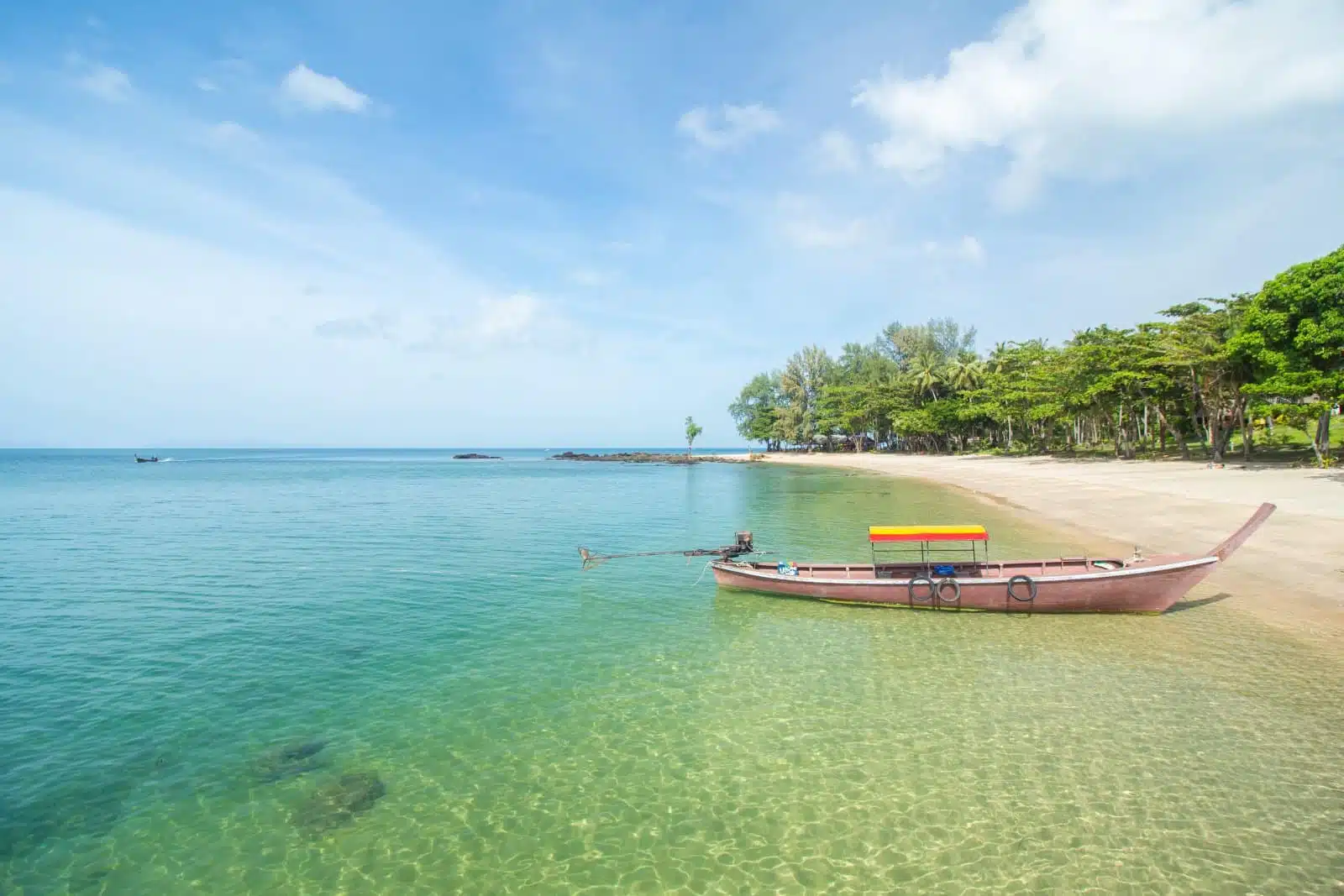
Image Credit: Shutterstock / bang tongkeawsawat
Between Krabi and Koh Lanta, Koh Jum is a sanctuary of peace and natural beauty. The island, with its unspoiled beaches and lush tropical forests, offers a retreat from the world, where the only sounds are the gentle waves and the rustling leaves. The local villages, scattered along the coast, warmly welcome visitors, offering a glimpse into a lifestyle that has remained unchanged for generations. The island’s beaches, from the golden sands of Ao Si to the rocky shores of Ao Luboa, offer secluded spots for relaxation and reflection. For those seeking to immerse themselves in nature, the island’s interior offers hikes through dense jungle to hidden waterfalls and breathtaking viewpoints. Koh Jum is a testament to the beauty of simplicity, a place where time slows down, and the spirit is renewed.
Insider’s Tip
For an unforgettable experience, join a local fisherman for a day, learning about sustainable fishing practices and the island’s marine life.
When to Travel
The optimal time to visit Koh Jum is during the dry season, from November to April, when the weather is pleasant, and the island’s beaches and forests are most accessible.
How to Get There
Koh Jum is accessible by boat from Krabi’s mainland, with transfers often arranged by accommodations on the island.
5. Koh Kradan
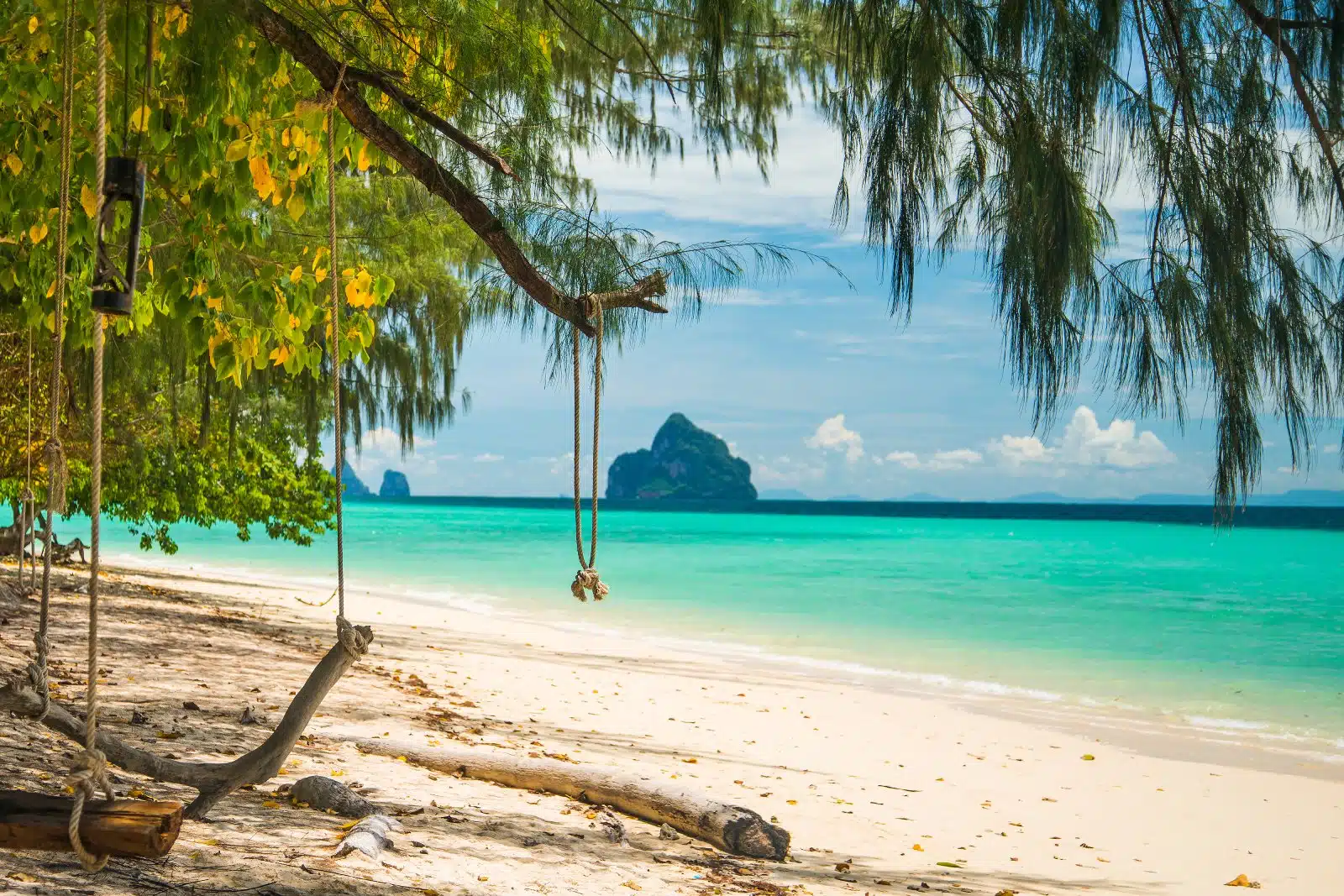
Image Credit: Shutterstock / JKI14
Koh Kradan, part of the enchanting Trang Archipelago, is celebrated for its crystal-clear waters and powdery white sand beaches, making it a slice of paradise for beach lovers and snorkelers. The island’s underwater wedding ceremony, an annual event, adds a unique cultural highlight, drawing couples from across the globe to exchange vows in an aquatic setting. Despite its growing popularity, Koh Kradan has retained a sense of untouched beauty, with minimal development ensuring that its natural landscapes remain pristine. Just a short swim from the shore, the coral reefs are alive with colorful marine life, offering easy access to some of Thailand’s most vibrant underwater ecosystems. Koh Kradan embodies the delicate balance between accessibility and preservation, offering a tranquil escape into the heart of Thailand’s marine splendor.
Insider’s Tip
Visit during the low season (May to October) for a more secluded experience, with the added bonus of witnessing the island’s natural beauty in full bloom.
When to Travel
For secluded beach experiences and optimal snorkeling conditions, the best time to visit Koh Kradan is during the low season, from May to October, when the island is less crowded.
How to Get There
Koh Kradan is reachable by boat from the Pak Meng Pier in Trang, with the journey itself offering breathtaking views of the surrounding seascape.
6. Koh Bulon Lae
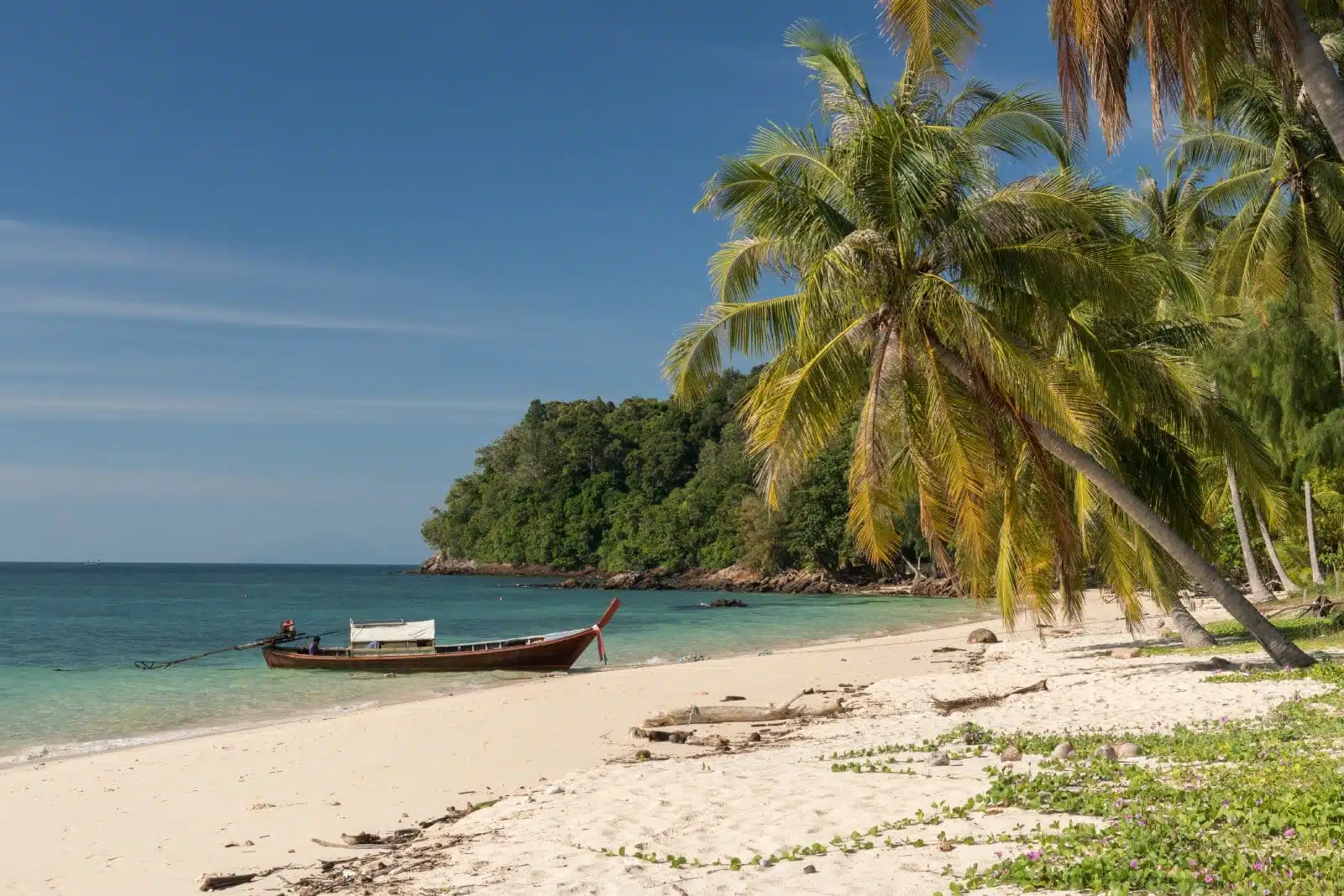
Image Credit: Shutterstock / Michelle Holihan
Koh Bulon Lae is a testament to tranquility and sustainable living, starkly contrasting Thailand’s more commercialized islands. This small island paradise in the Satun Province has lush jungles, white sandy beaches, and crystal-clear waters, providing a serene backdrop for a relaxing getaway. The local communities here, including the Moken Sea Nomads, live in harmony with their surroundings, offering insights into a lifestyle that prioritizes environmental preservation and simplicity. The island’s commitment to eco-tourism is evident in its minimal development, with a handful of low-impact resorts and bungalows emphasizing conservation and cultural respect. The beaches, particularly Panka Yai and Panka Noi, are perfect for those seeking solitude and a chance to connect with nature, while the surrounding coral reefs offer snorkelers a vibrant underwater world to explore. Koh Bulon Lae is a destination where time seems to stand still, inviting visitors to step into a slower pace of life and embrace the beauty of unspoiled nature.
Insider’s Tip
Engage with the local community by participating in a cultural exchange or volunteering opportunity, deepening your understanding of the island’s way of life.
When to Travel
Koh Bulon Lae is best visited from November to April, during the dry season, when the weather is ideal for beach activities and exploring the island’s natural beauty.
How to Get There
Access to Koh Bulon Lae is via a speedboat from Pak Bara Pier, which offers a quick and scenic route to the island.
7. Koh Tao
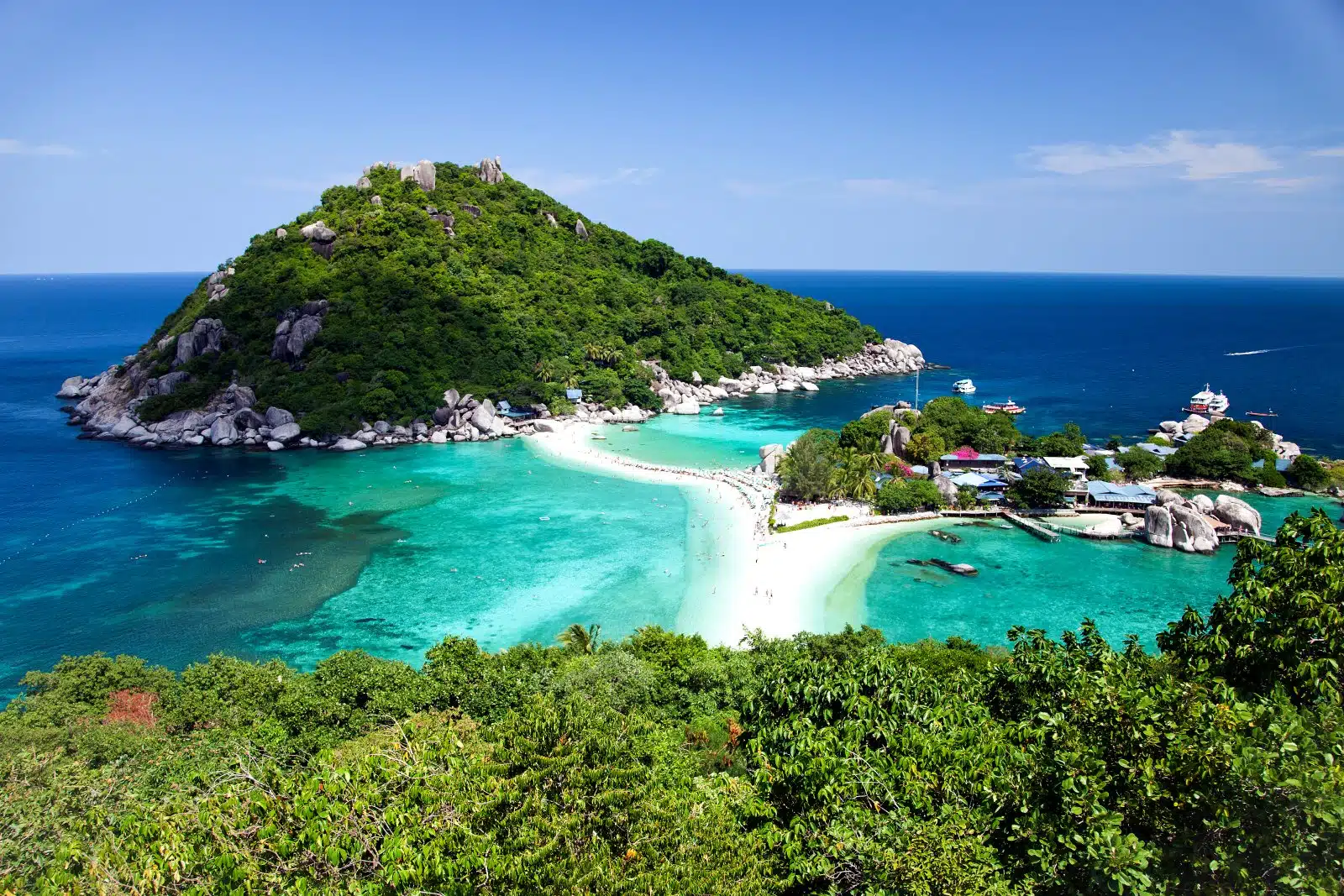
Image Credit: Shutterstock / SERG60
Koh Tao, a small island in the Gulf of Thailand, has carved out a reputation as a premier destination for divers and snorkelers, drawn to its clear waters, abundant marine life, and vibrant coral reefs. Beyond its underwater magic, Koh Tao is deeply committed to marine conservation, with numerous dive shops and local organizations leading efforts in restoring coral reefs and protecting marine species. The island’s rugged terrain offers adventurous trails leading to secluded bays and stunning viewpoints, balancing land and sea activities. Though more subdued than its larger neighbors, the nightlife and dining scene offers a glimpse into the island’s community spirit, with local businesses supporting sustainable practices. Koh Tao’s blend of natural beauty, adventurous spirit, and commitment to conservation makes it a unique destination for eco-conscious travelers seeking to explore Thailand’s underwater wonders while contributing to their preservation.
Insider’s Tip
Participate in a coral propagation workshop or a beach clean-up to contribute to the island’s conservation initiatives while learning about marine ecology.
When to Travel
The best time for diving and snorkeling in Koh Tao is from July to September when the water visibility is at its peak. However, the period from March to June is also favorable for land activities and fewer tourists.
How to Get There
Koh Tao is accessible by ferry from Chumphon or Koh Samui, with the journey providing stunning views of the Gulf of Thailand’s islands.
8. Koh Mak
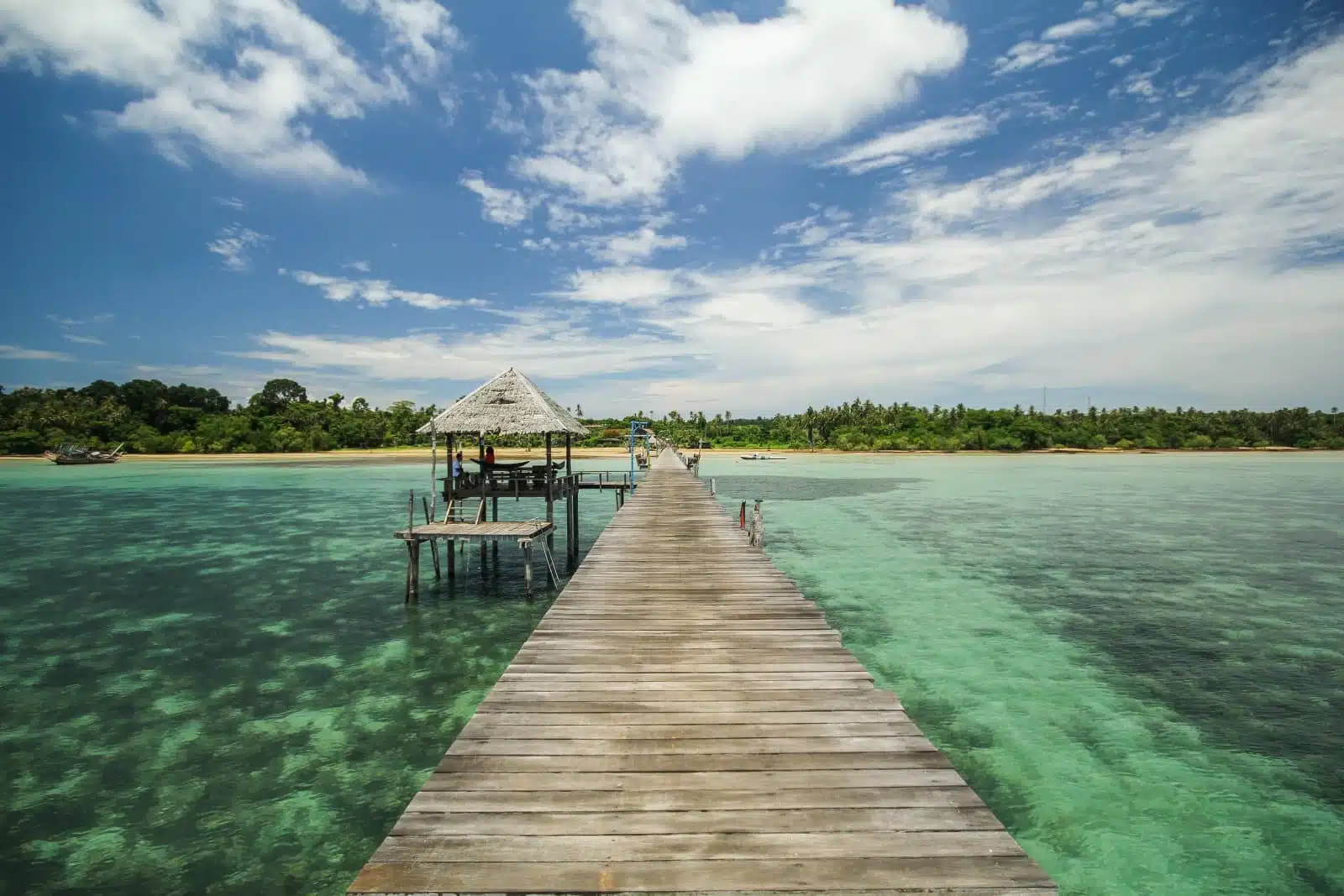
Image Credit: Shutterstock / SATHIANPONG PHOOKIT
Koh Mak, a tranquil island located in the eastern Gulf of Thailand, stands as a model for sustainable tourism within the country. Owned by a single family committed to preserving the island’s natural beauty, Koh Mak has managed to maintain a low-key atmosphere despite its stunning beaches and clear waters. The island is dotted with rubber plantations and coconut groves, with a network of roads perfect for cycling enthusiasts to explore. Its coral reefs are part of a marine protected area, offering snorkeling and diving experiences that are both breathtaking and respectful of the marine environment. Accommodations on Koh Mak range from eco-friendly bungalows to luxury villas, all designed to minimize their environmental impact. The island’s commitment to green initiatives, including waste management and renewable energy, sets a precedent for responsible travel in Thailand. Koh Mak is not just a destination but a retreat into a sustainable way of life, where the beauty of nature is preserved for future generations to enjoy.
Insider’s Tip
Explore the island’s network of cycling paths to discover hidden beaches and viewpoints, offering a unique perspective on Koh Mak’s natural beauty.
When to Travel
Koh Mak’s dry season, from November to February, offers the perfect climate for enjoying the island’s beaches, cycling, and outdoor activities in comfortable weather.
How to Get There
Koh Mak is reachable by speedboat from Trat or Koh Chang, with the journey showcasing the tranquil beauty of Thailand’s eastern seascape.
9. Koh Lao Liang
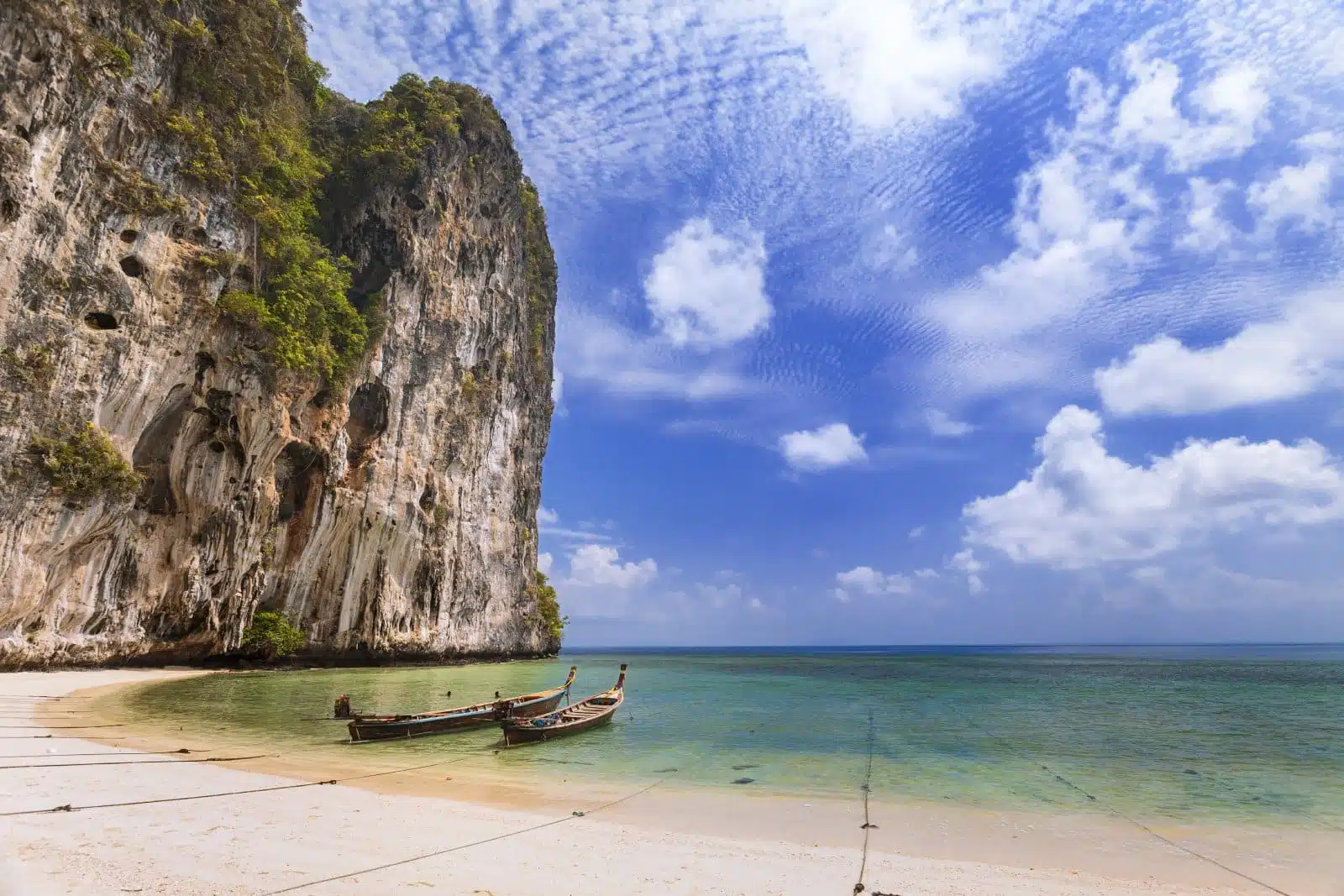
Image Credit: Shutterstock / non15
Koh Lao Liang, part of the Petra Archipelago, is a hidden gem that offers an intimate connection with nature away from the crowds. This island is renowned for its towering limestone cliffs that provide some of Thailand’s best rock climbing experiences, set against the backdrop of the Andaman Sea’s turquoise waters. The beaches here are pristine, with soft white sand and clear waters ideal for snorkeling and kayaking, allowing visitors to explore the rich marine life and coral gardens. The island’s approach to tourism is highly sustainable, with eco-tents and minimal development ensuring a low environmental footprint. Koh Lao Liang’s commitment to preserving its natural beauty while offering adventure and relaxation makes it a must-visit for those looking to explore Thailand’s natural wonders in a responsible and sustainable manner.
Insider’s Tip
Take a guided climb to experience Koh Lao Liang’s dramatic landscapes from a new vantage point, with routes suitable for all skill levels.
When to Travel
Climbers and adventurers should aim to visit Koh Lao Liang from November to April, when the weather is dry, and the climbing conditions are optimal.
How to Get There
Access to Koh Lao Liang is via boat from the mainland town of Pak Meng, offering an adventurous start to your island experience.
10. Koh Sichang
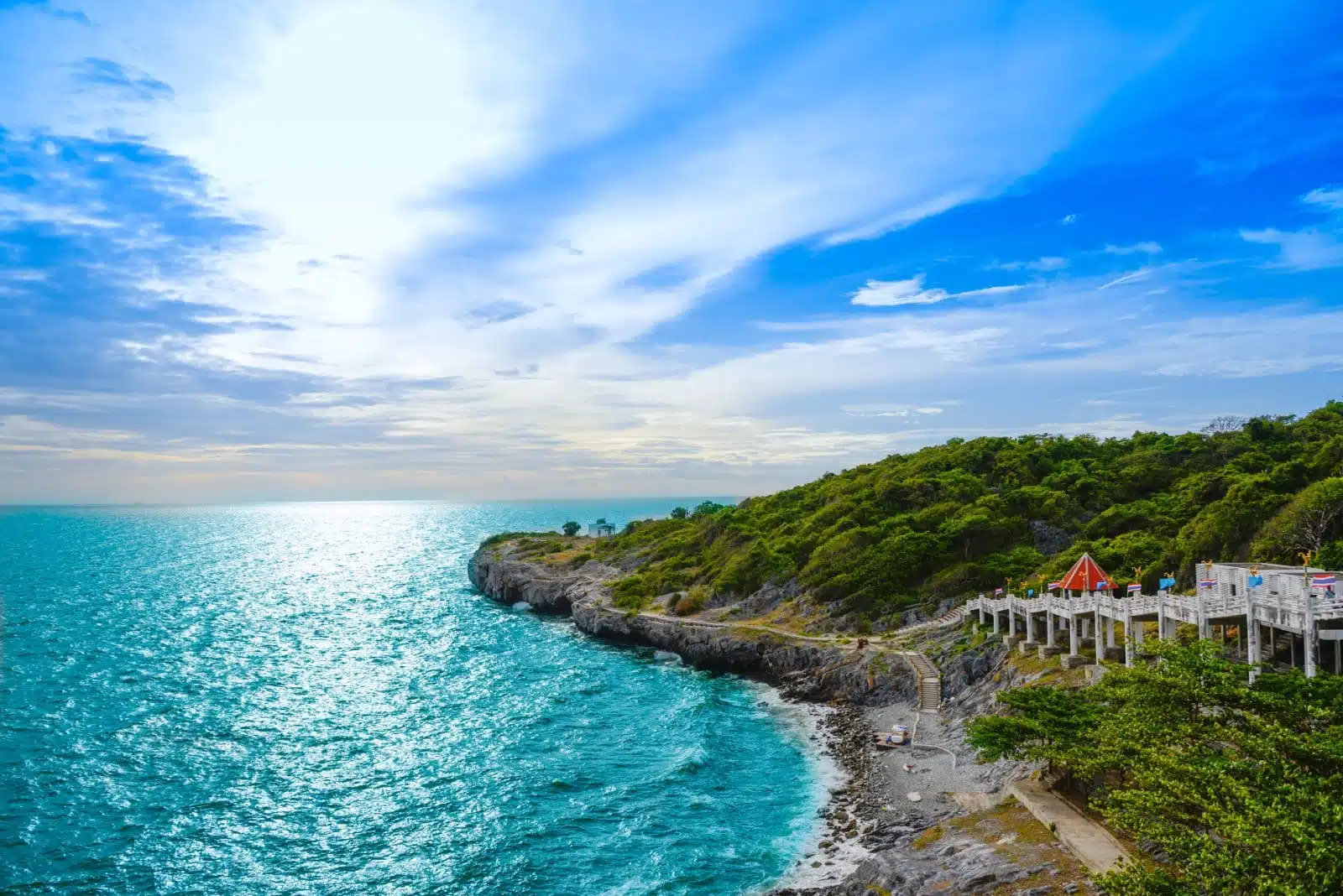
Image Credit: Shutterstock / spiphotoone
Koh Sichang, situated in the Gulf of Thailand, offers a unique blend of cultural heritage and serene landscapes. This island, once a royal retreat, is steeped in history, with ancient temples, a summer palace, and colonial buildings dotting its landscape. Despite its proximity to Bangkok, Koh Sichang maintains a peaceful atmosphere, with quiet beaches and lush hillsides offering a tranquil escape. The island’s slow pace of life and cultural richness make it an ideal destination for those seeking to immerse themselves in Thailand’s history while enjoying its natural beauty. Sustainable tourism practices on Koh Sichang ensure its historical sites and natural environments are preserved, offering a thoughtful and respectful way to experience one of Thailand’s lesser-known islands.
Insider’s Tip
Visit the San Jao Phaw Khao Yai, a Chinese temple with stunning sea views, for a peaceful moment of reflection.
When to Travel
The ideal time to explore Koh Sichang’s cultural sites and beaches is during the dry season, from November to April, when the weather is mild and conducive to outdoor exploration.
How to Get There
Koh Sichang can be reached by ferry from the Sri Racha Pier, with the short crossing offering picturesque views of the coastline.
11. Koh Wai
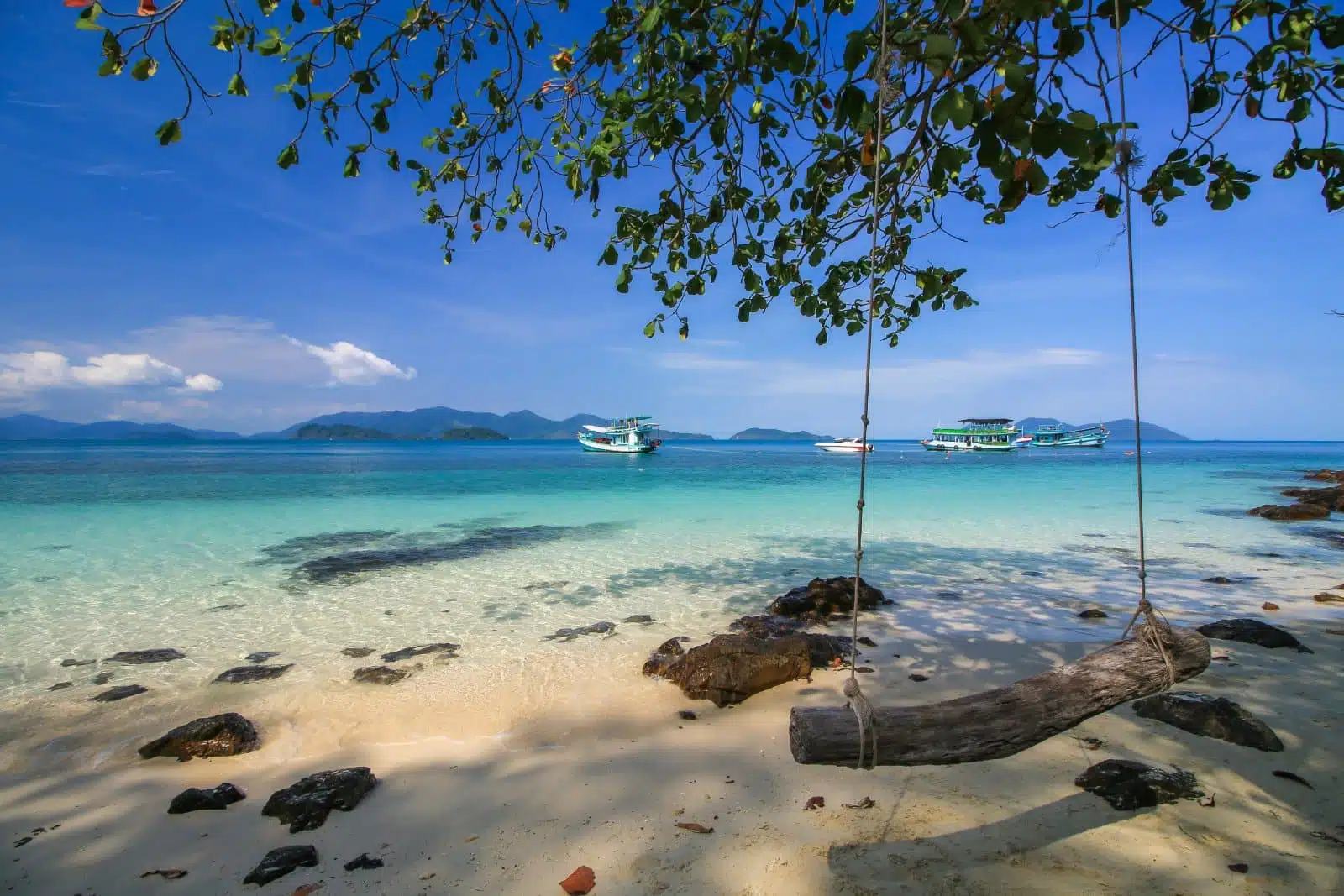
Image Credit: Shutterstock / APICHIT BOV
Koh Wai, nestled between Koh Chang and Koh Mak, is a peaceful sanctuary for travelers seeking to disconnect and immerse themselves in nature. With its pristine beaches and clear, shallow waters, this small island is a paradise for snorkelers and those looking to unwind in a serene setting. The coral reefs just offshore are teeming with marine life, providing easy access to an underwater world of wonder. With only a few accommodations and no roads, Koh Wai encourages a simple, eco-friendly approach to island life, where electricity is limited, and the stars light up the night sky. The island’s commitment to preserving its natural beauty and providing a haven of tranquility makes Koh Wai a precious jewel in Thailand’s archipelago, inviting visitors to experience the essence of untouched paradise.
Insider’s Tip
Bring snorkeling gear to explore the vibrant coral reefs just offshore, home to a colorful array of fish and marine life.
When to Travel
To enjoy Koh Wai’s tranquil beaches and excellent snorkeling conditions, plan your visit during the dry season, from November to April, when the seas are calm and the island is most accessible.
How to Get There
Koh Wai is accessible by boat from Koh Chang, with the journey revealing the stunning beauty of Thailand’s eastern islands.
12. Koh Lipe
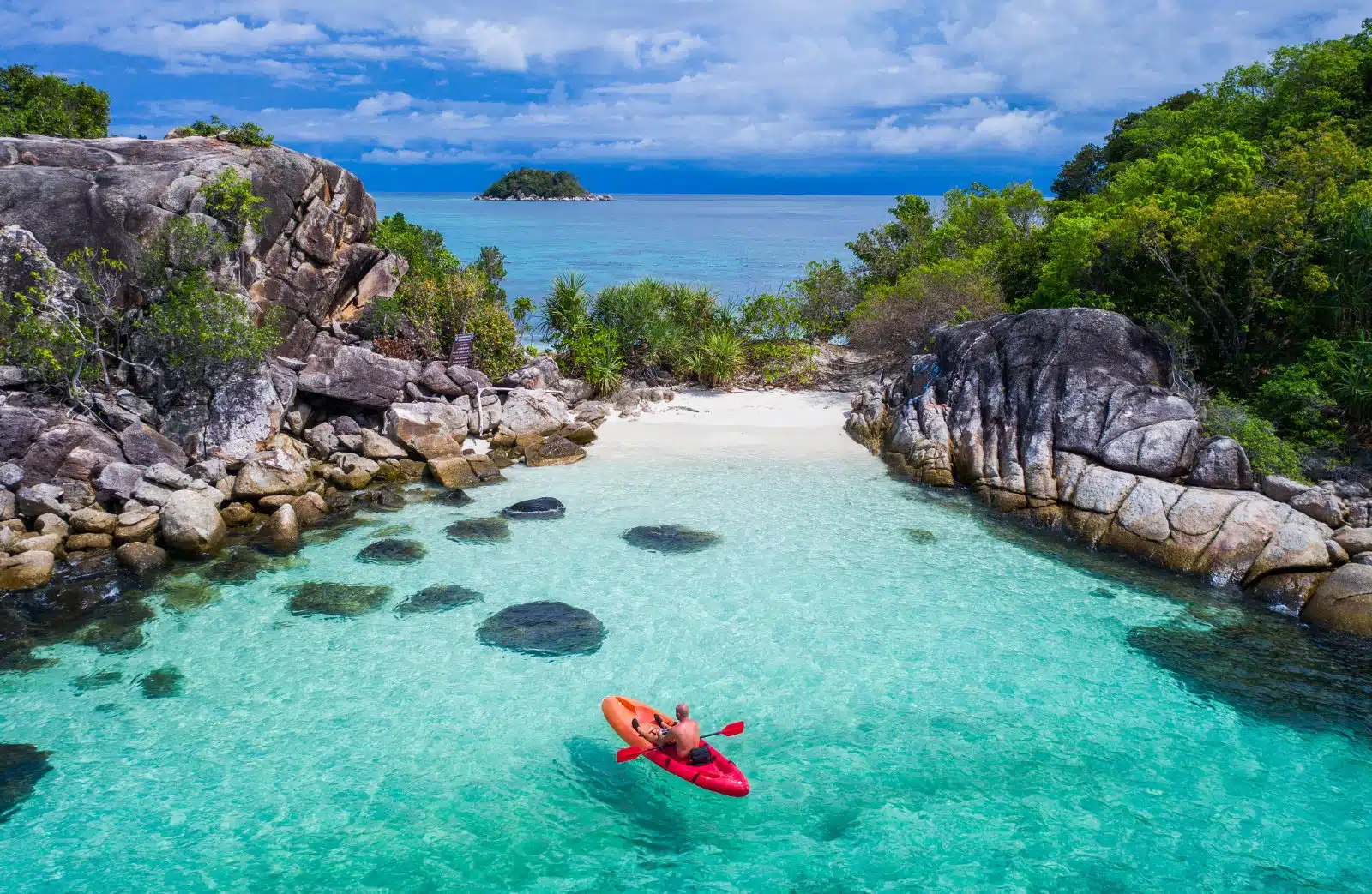
Image Credit: Shutterstock / NAS CREATIVES
Koh Lipe, located in the southern Andaman Sea, is often celebrated for its breathtaking beauty, earning it the nickname “the Maldives of Thailand.” Despite its popularity, the island has managed to strike a balance between development and the preservation of its natural and marine environments. The vibrant coral reefs surrounding Koh Lipe are part of the Tarutao National Marine Park, offering exceptional opportunities for snorkeling and diving while emphasizing the importance of marine conservation. The island’s Walking Street provides a lively hub of activity, with a variety of dining and shopping options that showcase the local culture and cuisine. Koh Lipe’s commitment to sustainable tourism practices, including efforts to protect its coral reefs and reduce waste, ensures that visitors can responsibly enjoy the island’s natural splendor.
Insider’s Tip
Take a sunrise or sunset kayak trip around the island to experience its tranquil beauty in the soft light of dawn or dusk.
When to Travel
Koh Lipe is best visited from November to April, during the dry season, when the weather is favorable for beach activities, snorkeling, and diving, offering clear skies and calm seas.
How to Get There
Koh Lipe is reachable by ferry from Pak Bara Pier on the mainland, with direct connections available during the high season from Langkawi, Malaysia.
The Bottom Line
Exploring Thailand’s lesser-known islands offers a unique opportunity to experience the country’s stunning natural beauty, rich cultural heritage, and commitment to sustainable tourism. By choosing to visit these hidden gems, you not only enjoy a more serene and authentic island experience but also contribute to preserving these fragile ecosystems and the well-being of local communities. As you embark on your island-hopping adventure, remember that your travel choices can make a positive impact, ensuring that Thailand’s islands remain vibrant and welcoming for generations to come.
More From The Green Voyage
12 Best Practices for Sustainable Travel in 2024 – How to Travel With Minimal Environmental Impact
Unlocking Hotel Perks – A Traveler’s Guide to Maximizing Hotel Reward Programs for Optimal Benefits
Travel Hacks for Frequent Flyers – 6 Tips and Tricks to Make the Best of Air Travel
The post Island Hopping in Thailand 2024 – A Guide to the 12 Lesser-Known Islands first appeared on The Green Voyage.
Featured Image Credit: Shutterstock / Peera_stockfoto.
For transparency, this content was partly developed with AI assistance and carefully curated by an experienced editor to be informative and ensure accuracy.
Tips for Trip Success
Book Your Flight
Find an inexpensive flight by using Kayak, a favorite of ours because it regularly returns less expensive flight options from a variety of airlines.
Book Your Hotel or Special Accommodation
We are big fans of Booking.com. We like their review system and photos. If we want to see more reviews and additional booking options, we go to Expedia.
You Need Travel Insurance!
Good travel insurance means having total peace of mind. Travel insurance protects you when your medical insurance often will not and better than what you get from your credit card. It will provide comprehensive coverage should you need medical treatment or return to the United States, compensation for trip interruption, baggage loss, and other situations.Find the Perfect Insurance Plan for Your Trip
